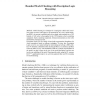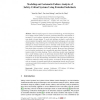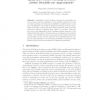143
click to vote
TABLEAUX
2007
Springer
15 years 8 months ago
2007
Springer
Abstract. Model checking is a technique for verifying that a finite-state concurrent system is correct with respect to its specification. In bounded model checking (BMC), the sys...
125
click to vote
SPIN
2007
Springer
15 years 8 months ago
2007
Springer
Abstract. Computational resources are increasing rapidly with the explosion of multi-core processors readily available from major vendors. Model checking needs to harness these res...
SPIN
2007
Springer
15 years 8 months ago
2007
Springer
Boolean programs are frequently used to model abstractions of software programs. They have the advantage that reachability properties are decidable, despite the fact that their sta...
110
click to vote
SAFECOMP
2007
Springer
15 years 8 months ago
2007
Springer
With the rapid progress in science and technology, we find ubiquitous use of safety-critical systems in avionics, consumer electronics, and medical instruments. In such systems, u...
135
Voted
LFCS
2007
Springer
15 years 8 months ago
2007
Springer
We present a general algorithm scheme for model checking logics of knowledge, common knowledge and linear time, based on simulations to a class of structures that capture the way t...
127
Voted
ICSOC
2007
Springer
15 years 8 months ago
2007
Springer
Model checking Web service behaviour has remained limited to checking safety and liveness properties. However when viewed as a multi agent system, the system composition can be ana...
117
click to vote
FORMATS
2007
Springer
15 years 8 months ago
2007
Springer
Abstract. Quantitative model checking computes the probability values of a given property quantifying over all possible schedulers. It turns out that maximum and minimum probabilit...
104
click to vote
FMCAD
2007
Springer
15 years 8 months ago
2007
Springer
— Induction has been studied in model checking for proving the validity of safety properties, i.e., showing the absence of counterexamples. To our knowledge, induction has not be...
102
click to vote
FMCAD
2007
Springer
15 years 8 months ago
2007
Springer
Abstract— Model checking can be aided by inductive invariants, small local properties that can be proved by simple induction. We present a way to automatically extract inductive ...
110
click to vote
EUROGP
2007
Springer
15 years 8 months ago
2007
Springer
Abstract. Model checking is a way of analysing programs and programlike structures to decide whether they satisfy a list of temporal logic statements describing desired behaviour. ...



